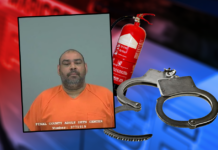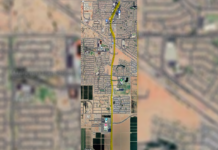
Individuals who have announced their intentions for public office must go through a process that includes collecting signatures and completing a nomination packet.
To be on the ballot for city council or mayor, the minimum number of signatures is 143. Petitions are available with the nomination packets, which contain an affidavit of qualifications, a financial disclosure statement and the nonpartisan nomination petition.
One can file as earlier as Nov. 14 and as late as Dec. 14.
Individuals must also file a Political Statement of Organization or a $500 Threshold Exemption Statement, which means a candidate doesn’t plan to spend more than $500.
City Clerk Venessa Bueras, who is responsible for city elections, said most individuals will file the Statement of Organization. This statement makes the candidates’ intentions public, allowing them to receive or spend money, circulate petitions and distribute campaign literature.
The 2012 city elections have been approved for an all mail-in ballot. Bueras said they had been evaluating the process based on past elections and in different cities.
“At the last election, approximately 75 percent of our residents voted by mail,” Bueras said. “So that’s been a trend in the last few elections.”
Bueras said the cost for the election falls solely on the city, unless another government entity has something on the ballot. In those instances, there is a shared cost for voting precincts with the county or state. If any of those entities places something on a ballot, like a referendum for medical marijuana, the city would then have to open its precincts. By eliminating the precinct sites, the city said it will be saving money and it is hoped an all-mail ballot will increase voter participation.
“From what we’ve seen in other cities, their results range between 40 to 60 percent (voter turnout) compared to our 6 to 11 percent,” Bueras said.
Maricopa’s spring election stems from its incorporation in October 2003.
“We were required to hold elections as soon as possible to elect our council,” Bueras said. “Statute only allows us to have them in the spring or in the fall. And at the time, the closest one was in the spring.”
Candidates for City Council must be 18 on election day and must have lived in the city for one year preceding the election. It is a four-year term and mayor is a two-year term.
The most any candidate may receive from a single contribution is $410, or $820 from a married couple.
Primaries are held on March 13 and the general election is May 15. All candidates for mayor and council are on the ballot. A candidate who receives 50 percent plus one vote at the primary is elected outright. If none of the candidates receives more than 50 percent of the votes, then the top two for each seat move on to the general election.
“So if three seats are still open then the top six vote getters at the primary run at the general,” Bueras said. “If a mayor doesn’t get elected at the primary, then only two people can run for mayor at the general.”
A voter must be a resident of the state and must live within the city limits of Maricopa 29 days before the election. Residents who have dual residences will be eligible as long as they are registered in time.
Applications are accepted 8 a.m. to 5 p.m., Monday through Friday, at the City Clerk’s Office at City Hall, located at 45145 W. Madison Ave.
Interested residents can register at the Pinal County Recorder’s Office, 31 N. Pinal St., Building E in Florence, or online at www.ServiceArizona.com.
MAYOR AND CITY COUNCIL CANDIDATES
There are presently three candidates for mayor and five candidates for city council.
Mayoral race
Financial planner Christian Price was the first to announce his bid for mayor.
Price, who moved to Maricopa in 2005, has a wife, Cindy, a 5-year-old son and 6-month-old daughter. He served as a legislative analyst in the Arizona House of Representatives in 1998.
Price said he’ll bring ingenuity to balancing the city’s budget while addressing the needs of Maricopa’s diverse demographics.
Joe Hoover, a local business owner and chairman of Heritage District Citizens Advisory Committee, also is running.
Hoover first moved to Maricopa in 2003 to open the Legacy Montessori School with his wife, Carol, and was the first chairman of the city’s Planning and Zoning Committee.
Hoover said with his business and leadership skills he could be a good mayor and continue the right direction for the city.
Councilmember Carl Diedrich, the latest to announce for mayor, said he is the best choice because, unlike his opponents, he has experience serving on the Maricopa City Council.
Diedrich said if elected he would revamp city government to focus on the needs of the customer instead of protecting itself.
He moved to Maricopa in 2004 with his wife, Kimberly, and son, Nate, 7, and operates a small marketing consulting firm.

![Filiberto’s eyes building Maricopa restaurant An exterior view of a Filiberto's Mexican Food restaurant at an unknown location and date. [Jessica Boehm/Axios]](https://www.inmaricopa.com/wp-content/uploads/2024/05/axios-050724-filibertos-screenshot-e1715117410101-218x150.jpg)
![SR 238 closures start tomorrow SR 238 [File]](https://www.inmaricopa.com/wp-content/uploads/2022/04/az-238_e_seq_034-218x150.jpg)




![In mayoral race, it’s the Nancy Smith show Maricopa Chamber of Commerce Executive Director Kelly Anderson grills incumbent Mayor Nancy Smith in election's first campaign event April 30, 2024, at Southern Dunes Golf Club. [Elias Weiss]](https://www.inmaricopa.com/wp-content/uploads/2024/04/CRM_1009-218x150.jpg)
![City gave new manager big low-interest home loan City Manager Ben Bitter speaks during a Chamber of Commerce event at Global Water Resources on April 11, 2024. Bitter discussed the current state of economic development in Maricopa, as well as hinting at lowering property tax rates again. [Monica D. Spencer]](https://www.inmaricopa.com/wp-content/uploads/2024/04/spencer-041124-ben-bitter-chamber-property-taxes-web-218x150.jpg)
![3 things to know about the new city budget Vice Mayor Amber Liermann and Councilmember Eric Goettl review parts of the city's 2024 operational budget with Mayor Nancy Smith on April 24, 2024. [Monica D. Spencer]](https://www.inmaricopa.com/wp-content/uploads/2024/04/spencer-042424-preliminary-budget-meeting-web-218x150.jpg)
![Merging lanes incite more 347 anger A merging lane sign sits on the side of State Route 347 northbound lanes during evening traffic on April 30, 2024. [Monica D. Spencer]](https://www.inmaricopa.com/wp-content/uploads/2024/04/spencer-043024-adot-merging-lanes-347-web-218x150.jpg)




![Filiberto’s eyes building Maricopa restaurant An exterior view of a Filiberto's Mexican Food restaurant at an unknown location and date. [Jessica Boehm/Axios]](https://www.inmaricopa.com/wp-content/uploads/2024/05/axios-050724-filibertos-screenshot-e1715117410101-100x70.jpg)

